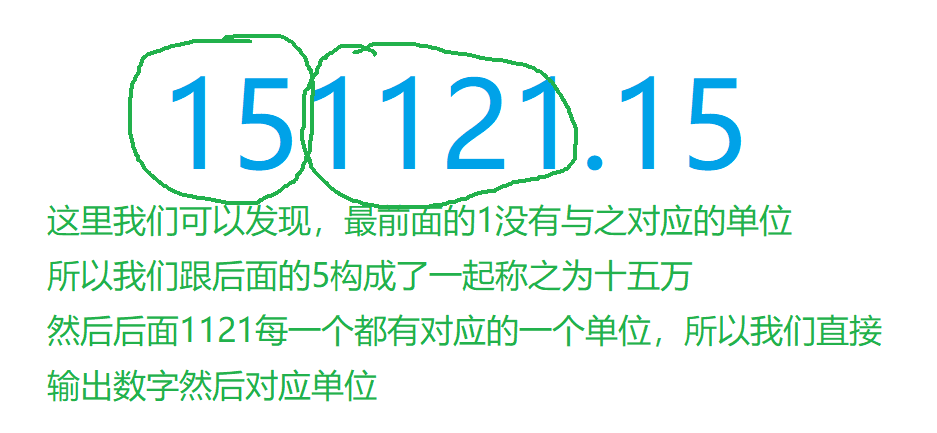描述
题目描述
就是给我们一个正常的阿拉伯数字, 让我们转换为我们中文的大写数字
这道题目, 本质上来讲就是一个大模拟
样例解释
给定我们的样例输入:
151121.15

所以我们的样例输出就是
人民币拾伍万壹仟壹佰贰拾壹元壹角伍分
题解
解法一: C++代码
实现思路
首先我们小数点后面的位置好判断, 我们可以直接用三个判断语句进行操作
然后难点在于我们的小数点前面的一个判断, 我们要对每一个位置进行一个判断, 这个位置如果没有对应的单位, 就如我上图所讲, 那么我们就是要跟下一个有单位的组成一个, 然后转换为中文输出, 然后我们接下来有单位的正常输出就可以了, 有零的情况需要特殊判断
代码实现
#include <bits/stdc++.h>
using namespace std;
vector<string> single = {"零", "壹", "贰", "叁", "肆",
"伍", "陆", "柒", "捌", "玖"};
void sayPre(string &pre) {
if (pre == "0") return ;
// 判断小数点前面是不是空的
for (int i = 0, j = pre.size() - 1; i < pre.size(); i++, j--) {
// i代表的是我们遍历的字符串, j是我们i后面有几个数
if (pre[i] != '0' and not(pre[i] == '1' and j % 4 == 1))
cout << single[pre[i] - '0'];
// 转换中文
if (j != 0 and j % 8 == 0 and j >= 8)
cout << "亿";
if (j != 0 and j % 4 == 0 and j % 8 != 0)
pre[i + 1] == '0' ? cout << "万零" : cout << "万";
if (j != 0 and j % 4 == 3 and pre[i] != '0')
pre[i + 1] == '0' and pre[i + 2] != '0' ? cout << "仟零" : cout << "仟";
if (j != 0 and j % 4 == 2 and pre[i] != '0')
pre[i + 1] == '0' and pre[i + 2] != '0' ? cout << "佰零" : cout << "佰";
if (j != 0 and j % 4 == 1 and pre[i] != '0')
cout << "拾";
}
// 上面的if分别对应后面输出的亿万千百十
cout << "元";
// 最后我们输出元
}
void sayEnd(string &end) {
if (end == "00")
cout << "整\n";
else if (end[0] == '0')
cout << single[end[1] - '0'] << "分\n";
else if (end[1] == '0')
cout << single[end[0] - '0'] << "角\n";
else
cout << single[end[0] - '0'] << "角" << single[end[1] - '0'] << "分\n";
// 分类讨论, 讨论我们小数点后两位的所有情况
}
signed main() {
string s;
while (cin >> s) {
string pre = "", end = "";
bool okk = false;
for (auto &it : s) {
if (it == '.') {
okk = true;
continue;
}
okk ? end += it : pre += it;
}
// 这里我们以小数点为分隔, 把小数点前面的存储到了pre里面,
// 小数点后面的存储到了end里面
cout << "人民币";
sayPre(pre), sayEnd(end);
}
return 0;
}
时空复杂度分析
对于本题目而言:
时间复杂度:
理由如下: 其实我们本质就是遍历了一个我们这个作为输入阿拉伯数字, 然而这个字符串的长度事实上并不会太长, 长度属于常数的级别, 所以我们可以把他理解为是
空间复杂度:
理由如下: 我们利用了常数级别的空间
对于这个代码而言:
时间复杂度:
理由如下: 遍历的是我们字符串的长度
空间复杂度:
理由如下: 我们需要把这个字符串存到两个字符串中
解法二: Python代码
实现思路
我们跟C++的代码类似, 但是我们用Python可以很好的把字符串区分为小数点前和小数点后, 然后我们再对每一个位置分别判断是否满足条件, 然后转换为中文或者输出他们的单位
代码实现
gewei = ['零', '壹', '贰', '叁', '肆',
'伍', '陆', '柒', '捌', '玖']
# 个位的所有数字
def main():
while True:
try:
pre, end = input().split('.')
# 把我们输入的字符串以我们的小数点作为一个分隔
print('人民币', end="")
idx = len(pre)
# 这个是我们每一个字符后面还有多少位
for i in range(0, len(pre)):
# 遍历我们所有的字符
idx -= 1
if pre[i] != '0' and not(pre[i] == '1' and idx % 4 == 1):
print(gewei[int(pre[i])], end="")
# 这个是需要转换位中文的
if idx != 0:
# 如果不是个位的话
if idx % 8 == 0 and idx >= 8:
print('亿', end="")
if idx % 4 == 0 and idx % 8 != 0:
if pre[i + 1] == '0':
print('万零', end="")
else:
print('万', end="")
if idx % 4 == 3 and pre[i] != '0':
if pre[i + 1] == '0' and pre[i + 2] != '0':
print('仟零', end="")
else:
print('仟', end="")
if idx % 4 == 2 and pre[i] != '0':
if pre[i + 1] == '0' and pre[i + 2] != '0':
print('佰零', end="")
else:
print('佰', end="")
if idx % 4 == 1 and pre[i] != '0':
print('拾', end="")
# 分别对我们的最后的单位进行一个判断
if pre != '0':
print('元', end="")
# 正常输出
if end == "00":
print("整")
elif end[0] == '0':
print(gewei[int(end[1])] + "分")
elif end[1] == '0':
print(gewei[int(end[0])] + "角")
else:
print(gewei[int(end[0])] + "角" + gewei[int(end[1])] + "分")
# 处理我们的小数点后面的位置
except:
break
if __name__ == '__main__':
main()
时空复杂度分析
对于本题而言
时间复杂度:
理由如下: 其实我们本质就是遍历了一个我们这个作为输入阿拉伯数字, 然而这个字符串的长度事实上并不会太长, 长度属于常数的级别, 所以我们可以把他理解为是
空间复杂度:
理由如下: 我们利用了常数级别的空间
对于这个代码而言:
时间复杂度:
理由如下: 遍历的是我们字符串的长度
空间复杂度:
理由如下: 我们需要把这个字符串存到两个字符串中






 京公网安备 11010502036488号
京公网安备 11010502036488号